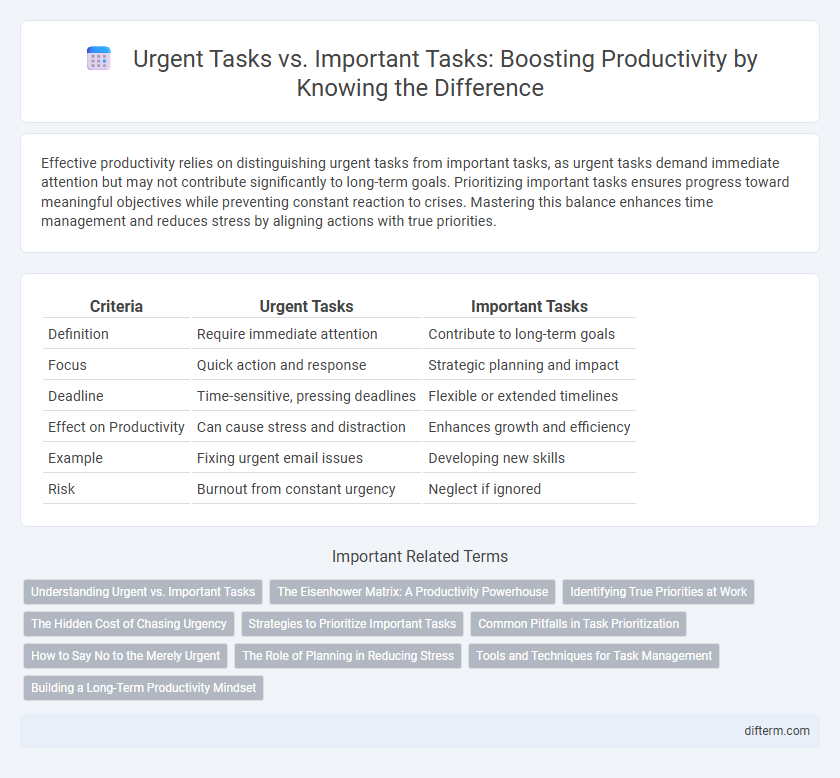Effective productivity relies on distinguishing urgent tasks from important tasks, as urgent tasks demand immediate attention but may not contribute significantly to long-term goals. Prioritizing important tasks ensures progress toward meaningful objectives while preventing constant reaction to crises. Mastering this balance enhances time management and reduces stress by aligning actions with true priorities.
Table of Comparison
| Criteria | Urgent Tasks | Important Tasks |
|---|---|---|
| Definition | Require immediate attention | Contribute to long-term goals |
| Focus | Quick action and response | Strategic planning and impact |
| Deadline | Time-sensitive, pressing deadlines | Flexible or extended timelines |
| Effect on Productivity | Can cause stress and distraction | Enhances growth and efficiency |
| Example | Fixing urgent email issues | Developing new skills |
| Risk | Burnout from constant urgency | Neglect if ignored |
Understanding Urgent vs. Important Tasks
Understanding urgent versus important tasks is crucial for effective time management and heightened productivity. Urgent tasks demand immediate attention and often stem from external pressures, while important tasks align with long-term goals and values, fostering meaningful progress. Prioritizing important tasks over urgent but less significant ones reduces stress and enhances overall work quality.
The Eisenhower Matrix: A Productivity Powerhouse
The Eisenhower Matrix categorizes tasks into four quadrants based on urgency and importance, enabling effective prioritization that drives productivity. Tasks classified as important but not urgent receive focused attention to prevent missed deadlines, while urgent but less important tasks are delegated or minimized to reduce distractions. By consistently applying this method, individuals optimize time management, increase efficiency, and achieve strategic goals with clarity and purpose.
Identifying True Priorities at Work
Distinguishing urgent tasks from important tasks is crucial for effective productivity management, as urgent tasks demand immediate attention while important tasks contribute to long-term goals. Prioritizing important tasks over urgent but less significant ones enhances focus and drives meaningful progress in workplace objectives. Utilizing frameworks like the Eisenhower Matrix helps professionals identify and manage true priorities, improving time allocation and overall performance.
The Hidden Cost of Chasing Urgency
Constantly prioritizing urgent tasks over important ones leads to decreased productivity and poor long-term outcomes. Urgent tasks often demand immediate attention but lack strategic value, causing critical goals to be neglected and increasing stress levels. Understanding the hidden cost of chasing urgency helps in allocating time effectively to high-impact activities that drive sustainable success.
Strategies to Prioritize Important Tasks
Prioritizing important tasks requires distinguishing them from urgent ones by evaluating long-term impact rather than immediate deadlines. Utilizing methods such as the Eisenhower Matrix helps allocate time effectively, ensuring critical goals receive attention before time-sensitive but less impactful duties. Setting clear objectives, breaking tasks into manageable steps, and scheduling focused work sessions optimize productivity and decrease stress.
Common Pitfalls in Task Prioritization
Misidentifying urgent tasks as important often leads to misplaced focus, causing critical long-term goals to be neglected. Common pitfalls include reacting to constant interruptions and prioritizing tasks with immediate deadlines over those that contribute significantly to overall productivity. Efficient prioritization requires distinguishing between urgency and importance to allocate time effectively and maintain progress on strategic objectives.
How to Say No to the Merely Urgent
Prioritize important tasks by clearly defining your goals and assessing the long-term impact before committing. Use assertive but polite language to say no to merely urgent requests, such as "I need to focus on high-priority projects right now." Establish boundaries by scheduling dedicated time for strategic work, preventing disruptions from urgent but less significant demands.
The Role of Planning in Reducing Stress
Effective planning prioritizes important tasks to allocate time and resources efficiently, reducing the overwhelm caused by urgent but less critical activities. By distinguishing between urgent and important tasks, individuals create structured schedules that minimize last-minute pressures and prevent crisis-driven work. Consistent planning enhances focus, promotes proactive decision-making, and significantly lowers stress levels associated with multitasking and time scarcity.
Tools and Techniques for Task Management
Prioritizing urgent tasks often leads to reactive work, while focusing on important tasks drives long-term productivity and goal achievement. Utilizing tools like Eisenhower Matrix and techniques such as time blocking or Pomodoro enhances task management by categorizing priorities and minimizing distractions. Digital planners, task management apps like Todoist or Trello, and automation tools streamline workflow, ensuring important tasks receive dedicated attention and deadlines are met efficiently.
Building a Long-Term Productivity Mindset
Focusing on important tasks rather than urgent ones fosters a long-term productivity mindset essential for sustained success and growth. Prioritizing strategic goals over reactive duties enables deeper work and continuous improvement. Developing habits that distinguish urgency from importance prevents burnout and supports meaningful achievements.
urgent tasks vs important tasks Infographic

 difterm.com
difterm.com